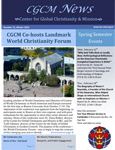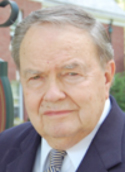CGCM Winter 2014 Newsletter is here!
 The CGCM Winter 2014 Newsletter is out, you can get your copy at the Center or see the PDF online here.
The CGCM Winter 2014 Newsletter is out, you can get your copy at the Center or see the PDF online here.
Chris James’ review of Perspectives on Ecclesiology and Ethnography
 Doctoral student Christopher James has recently reviewed a book on the intersection of ecclesiology and anthropology, Perspectives on Ecclesiology and Ethnography, edited by Pete Ward. Check out the review in Missiology: An International Review 42 (1), January 2014, 92-93.
Doctoral student Christopher James has recently reviewed a book on the intersection of ecclesiology and anthropology, Perspectives on Ecclesiology and Ethnography, edited by Pete Ward. Check out the review in Missiology: An International Review 42 (1), January 2014, 92-93.
The Future of Christianity by the Numbers
Gina Bellofatto, student affiliate of the CGCM, and Dr. Todd Johnson’s described, “Key Findings of Christianity in Its Global Context, 1970–2020.” The article appeared in the International Bulletin of Missionary Research and is available for free to online subscribers.
New Pew Survey on Global Religious Hostilities
A new Pew Research Center survey of global religious hostilities has been released. The survey found that one-third of the 198 countries surveyed showed a high level of social hostilities involving religion, the highest it has been since the survey began in 2007. A Christian Science Monitor story probes the causes and consequences of the change.
Alum Receives Book of the Year Award!
Sung-Deuk Oak’s new book, The Making of Korean Christianity, published this fall as the first of the new Baylor Studies in World Christianity monograph series, has been named “Book of the Year” by Books & Culture magazine.
You may view the announcement here.
Gina Zurlo gives papers at social science conferences NY and Boston
Doctoral student Gina Zurlo has recently given several papers and lectures at social science conferences. In August, she presented a paper at the American Sociological Association annual meeting in New York City, titled, "Christian Sociology in Transition: The Institute of Social and Religious Research," which discussed an early phase of American sociology and its intersections with the social gospel and ecumenical movements in the early 20th century. She also gave a paper at the Society for the Scientific Study of Religion annual meeting in Boston on the development and use of demographic databases.
Distinguished Alum Jerry Anderson Honored in Rome
 Gerald (Jerry) Anderson (STH’55, GRS’60) met Pope Francis, gave a lecture and received an honorary Doctor of Missiology degree from the Pontifical Urbaniana University in Rome on November 14. The degree was presented to him by Cardinal Fernando Filoni, the Chancellor of the university. It was the first time an honorary degree has been given to a Protestant by this university that was founded in 1627 and is owned by the Sacred Congregation for the Evangelization of Peoples. Dr. Anderson, a former UM missionary in the Philippines and president of Scarritt College in Nashville, is emeritus director of the Overseas Ministries Study Center in New Haven, CT, and resides in Hamden, CT.
Gerald (Jerry) Anderson (STH’55, GRS’60) met Pope Francis, gave a lecture and received an honorary Doctor of Missiology degree from the Pontifical Urbaniana University in Rome on November 14. The degree was presented to him by Cardinal Fernando Filoni, the Chancellor of the university. It was the first time an honorary degree has been given to a Protestant by this university that was founded in 1627 and is owned by the Sacred Congregation for the Evangelization of Peoples. Dr. Anderson, a former UM missionary in the Philippines and president of Scarritt College in Nashville, is emeritus director of the Overseas Ministries Study Center in New Haven, CT, and resides in Hamden, CT.
Zurlo Lectures in Busan
Doctoral student Gina Zurlo was on the faculty of the Global Ecumenical Theological Institute at the 10th Assembly of the World Council of Churches in Busan, South Korea (October 30–November 8, 2013). Gina gave a lecture titled, "Demographics of World and Asian Christianity" to a group of 200 students from 60 countries, representing 80 different denominations, and also offered reflections on the future of the ecumenical movement in light of trends in global Christianity. Videos of her lecture can be found in two parts, here and here.
Roldán-Figueroa at 2013 Sixteenth Century Studies Conference
The 2013 Sixteenth Century Studies Conference was held from October 24-27 in San Juan, Puerto Rico. Professor Roldán-Figueroa served as Theology Track Director for the conference. The theology track had a total of sixteen panels. Roldán-Figueroa organized eight panels, and chaired three of them. One of the panelists was BU STH Professor Claire Wolfteich, whose paper was entitled "Spiritual Guidance for those 'In the World': A Theology of Lay Spiritual Practice in Francis de Sales and Jane de Chantal." Roldán-Figueroa presented a paper related to the missionary work of Discalced Franciscans in the Philippines, "Enlisting Saints for the Cause of Catholic Missions: Marcelo de Ribadeneira’s Historia de las Islas del Archipiélago Filipino (Barcelona, 1601)." The session was sponsored by REFO500 and VU University Amsterdam. The other two panelists were Professor Sabine Hiebsch from VU University Amsterdam and Professor Tarald Rasmussen from the University of Oslo" You can see picture of the panelists here.
Highlights of the World Christianity Forum
Important scholars of World Christianity and Directors of Centers of World Christianity in North American and Europe convened for the first time at Boston University from October 17-19. The importance of the conference was apparent from the beginning, as participants came to Boston at their own expense, and with great enthusiasm for the opportunity to meet other center directors and scholars. Hosts of the conference were Dr. Dana Robert, director of the Center for Global Christianity and Mission at BU, and Dr. Todd Johnson, director of the Center for the Study of Global Christianity at Gordon-Conwell. The purpose of the conference—the World Christianity Forum—was to begin to map the contours of this emerging area and to identify important questions that need to be addressed in order to establish its identity.
The Forum began with presentations by the directors of each World Christianity center attending. Their purposes—teaching, research and documentation, and public outreach and service—turned out to be similar. What differed was the structure of each center and its institutional locus or absence thereof. The most significant defining attributes were the visions of the center founders, and the organizational context of particular centers. . Centers located in secular universities were more likely to emphasize teaching and global level historical research and documentation, all of which give them grounds for relating to secular scholars and religious studies departments. Centers located in seminaries or religious institutions are more likely to emphasize local level research including field work and case studies as well as training for and service to local churches. Freestanding centers have the ability to forge independent visions. The Overseas Ministries Study Center in New Haven, for instance, offers hospitality to foreign missionaries in the U.S. on furlough and also publishes the prestigious journal, the International Bulletin of Missionary Research. What the centers almost uniformly shared, however, was financial fragility. Regardless of the source of funding, whether a dwindling old endowment or grants from individuals or foundations, consistency of funding was felt by the directors to be uncertain.
In subsequent sessions, participants identified and began to wrestle with the larger questions of identity and function. One measure of how new “World Christianity” is as an academic discourse, is that its definition is not entirely clear to people outside institutions dedicated to its advancement. Nor is there agreement by people inside those institutions on what it should mean. The phrase “world Christianity” first emerged as a way to describe Christianity outside the West and research in the area is still generally focused on issues related to the Global South and immigrant churches in the West. Increasingly, though, teachers include Europe and North America in their use of the term. There were scholars attending the Forum who advocated for including Europe, in particular, in research studies.
Participants had different opinions about whether “World Christianity” captures a subject matter or whether it is a discipline with distinctive approaches and frameworks for interrogating cognate subjects such as contextual theology. One participant saw it as an “intersection point” for scholars from various disciplines but with similar interests. A number of participants recommended a descriptive and comparative approach, although there were differences of opinion on whether treating various manifestations of Christianity as phenomena also risked emptying World Christianity of any theological content.
A panel discussion held Friday afternoon and open to the entire community drew a large crowd from BU and beyond. Three of the Forum participants, Dr. Emma Wild-Wood from University of Cambridge, Dr. XiYi Yao from Gordon-Conwell Theological Seminary, and Dr. Jehu Hanicles from Emory University, gave talks focused on the relationship between World Christianity and theology, on Chinese Christianity, and on African Christianity respectively.
The final session on Saturday morning was devoted to small group discussions on how to divvy up the terrain and develop collaborative projects. Potential collaborative research projects, such as the next edition of the World Christian Encyclopedia, were presented. In final plenary, participants discussed possible next steps growing from this first World Christianity Forum. A logical next step might be to host a conference exclusively on the question “What Is World Christianity?” Another logical step would be to broaden the discussion among centers to include those in Asia, Africa, and Latin America. The Forum ended on a very positive note, as participants greatly appreciated the hospitality of Boston University in hosting the conference, and especially the opportunity to interact with peers in other centers and programs in World Christianity.